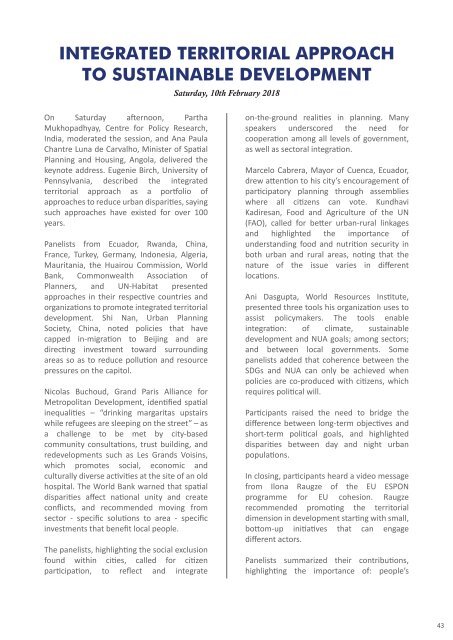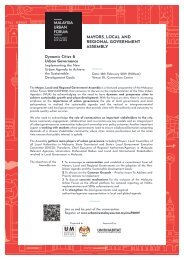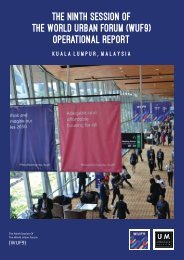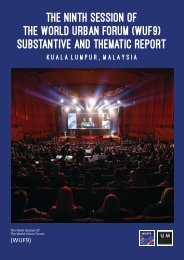WUF9 Substantive Report-s
Create successful ePaper yourself
Turn your PDF publications into a flip-book with our unique Google optimized e-Paper software.
INTEGRATED TERRITORIAL APPROACH<br />
TO SUSTAINABLE DEVELOPMENT<br />
Saturday, 10th February 2018<br />
On Saturday aernoon, Partha<br />
Mukhopadhyay, Centre for Policy Research,<br />
India, moderated the session, and Ana Paula<br />
Chantre Luna de Carvalho, Minister of Spaal<br />
Planning and Housing, Angola, delivered the<br />
keynote address. Eugenie Birch, University of<br />
Pennsylvania, described the integrated<br />
territorial approach as a porolio of<br />
approaches to reduce urban disparies, saying<br />
such approaches have existed for over 100<br />
years.<br />
Panelists from Ecuador, Rwanda, China,<br />
France, Turkey, Germany, Indonesia, Algeria,<br />
Mauritania, the Huairou Commission, World<br />
Bank, Commonwealth Associaon of<br />
Planners, and UN-Habitat presented<br />
approaches in their respecve countries and<br />
organizaons to promote integrated territorial<br />
development. Shi Nan, Urban Planning<br />
Society, China, noted policies that have<br />
capped in-migraon to Beijing and are<br />
direcng investment toward surrounding<br />
areas so as to reduce polluon and resource<br />
pressures on the capitol.<br />
Nicolas Buchoud, Grand Paris Alliance for<br />
Metropolitan Development, idenfied spaal<br />
inequalies – “drinking margaritas upstairs<br />
while refugees are sleeping on the street” – as<br />
a challenge to be met by city-based<br />
community consultaons, trust building, and<br />
redevelopments such as Les Grands Voisins,<br />
which promotes social, economic and<br />
culturally diverse acvies at the site of an old<br />
hospital. The World Bank warned that spaal<br />
disparies affect naonal unity and create<br />
conflicts, and recommended moving from<br />
sector - specific soluons to area - specific<br />
investments that benefit local people.<br />
The panelists, highlighng the social exclusion<br />
found within cies, called for cizen<br />
parcipaon, to reflect and integrate<br />
on-the-ground realies in planning. Many<br />
speakers underscored the need for<br />
cooperaon among all levels of government,<br />
as well as sectoral integraon.<br />
Marcelo Cabrera, Mayor of Cuenca, Ecuador,<br />
drew aenon to his city’s encouragement of<br />
parcipatory planning through assemblies<br />
where all cizens can vote. Kundhavi<br />
Kadiresan, Food and Agriculture of the UN<br />
(FAO), called for beer urban-rural linkages<br />
and highlighted the importance of<br />
understanding food and nutrion security in<br />
both urban and rural areas, nong that the<br />
nature of the issue varies in different<br />
locaons.<br />
Ani Dasgupta, World Resources Instute,<br />
presented three tools his organizaon uses to<br />
assist policymakers. The tools enable<br />
integraon: of climate, sustainable<br />
development and NUA goals; among sectors;<br />
and between local governments. Some<br />
panelists added that coherence between the<br />
SDGs and NUA can only be achieved when<br />
policies are co-produced with cizens, which<br />
requires polical will.<br />
Parcipants raised the need to bridge the<br />
difference between long-term objecves and<br />
short-term polical goals, and highlighted<br />
disparies between day and night urban<br />
populaons.<br />
In closing, parcipants heard a video message<br />
from Ilona Raugze of the EU ESPON<br />
programme for EU cohesion. Raugze<br />
recommended promong the territorial<br />
dimension in development starng with small,<br />
boom-up iniaves that can engage<br />
different actors.<br />
Panelists summarized their contribuons,<br />
highlighng the importance of: people’s<br />
43






